Taxation Law Essay: Australian Taxation of Multinational Corporations
VerifiedAdded on 2023/03/20
|12
|3064
|23
Essay
AI Summary
This essay provides a comprehensive analysis of taxation law in Australia, with a specific focus on tax avoidance strategies employed by multinational corporations. The introduction defines tax avoidance and its illegality under Australian law, highlighting the motivations behind corporate tax aggressiveness. The discussion delves into the complexities of the Australian corporate tax system, including residency rules, the sourcing of income, and the impact of globalization. It examines how the Australian tax system addresses income earned by companies both within and outside of Australia. The essay explores the role of the Australian government and the ATO in combating tax avoidance, including the introduction of the diverted tax policy and measures related to debt loading. The essay also addresses the principles of equity, efficiency, simplicity, and sustainability within the context of tax reform. It concludes by emphasizing the importance of these principles in ensuring a fair and effective taxation system that promotes voluntary compliance and minimizes opportunities for tax avoidance.
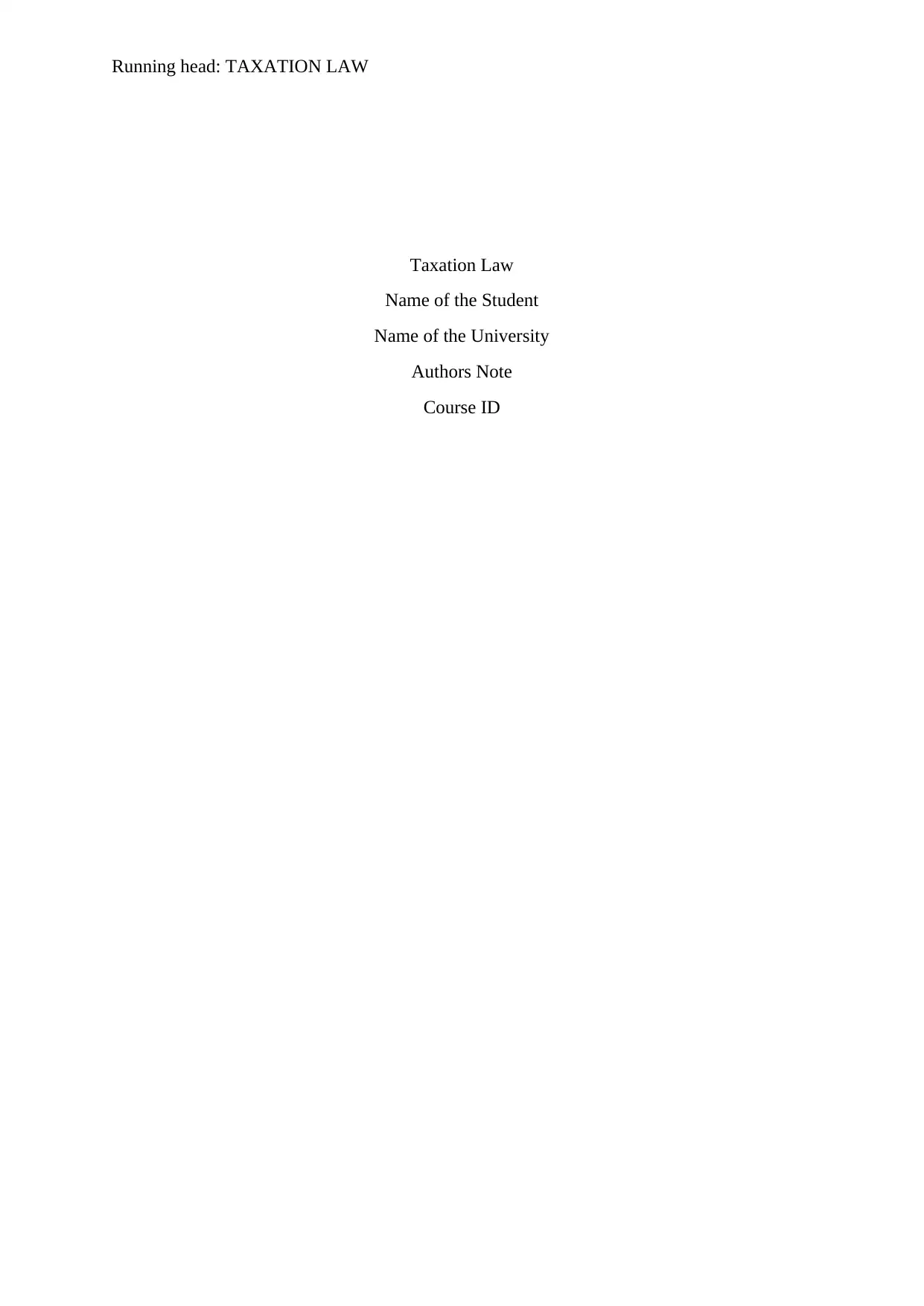
Running head: TAXATION LAW
Taxation Law
Name of the Student
Name of the University
Authors Note
Course ID
Taxation Law
Name of the Student
Name of the University
Authors Note
Course ID
Paraphrase This Document
Need a fresh take? Get an instant paraphrase of this document with our AI Paraphraser
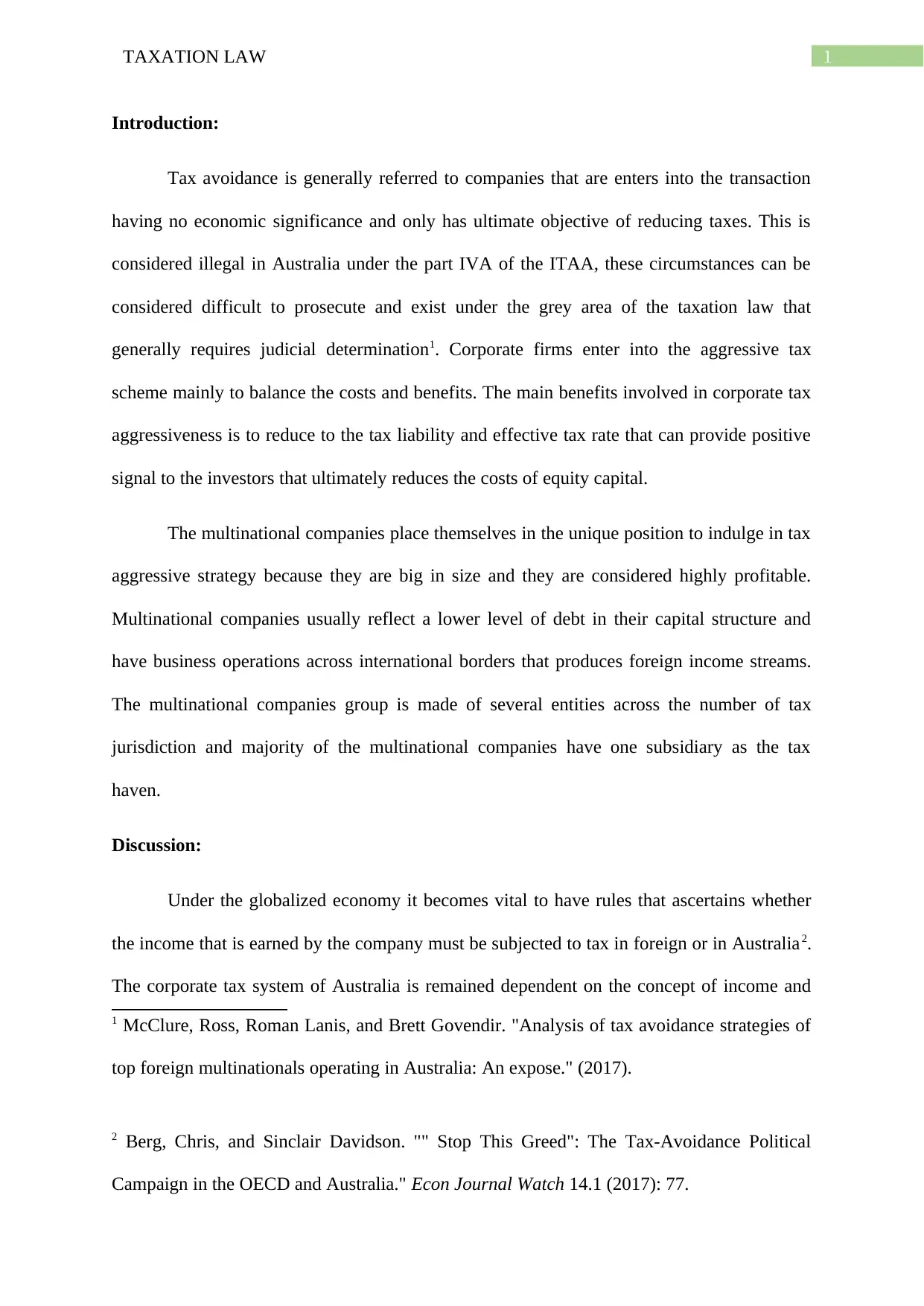
1TAXATION LAW
Introduction:
Tax avoidance is generally referred to companies that are enters into the transaction
having no economic significance and only has ultimate objective of reducing taxes. This is
considered illegal in Australia under the part IVA of the ITAA, these circumstances can be
considered difficult to prosecute and exist under the grey area of the taxation law that
generally requires judicial determination1. Corporate firms enter into the aggressive tax
scheme mainly to balance the costs and benefits. The main benefits involved in corporate tax
aggressiveness is to reduce to the tax liability and effective tax rate that can provide positive
signal to the investors that ultimately reduces the costs of equity capital.
The multinational companies place themselves in the unique position to indulge in tax
aggressive strategy because they are big in size and they are considered highly profitable.
Multinational companies usually reflect a lower level of debt in their capital structure and
have business operations across international borders that produces foreign income streams.
The multinational companies group is made of several entities across the number of tax
jurisdiction and majority of the multinational companies have one subsidiary as the tax
haven.
Discussion:
Under the globalized economy it becomes vital to have rules that ascertains whether
the income that is earned by the company must be subjected to tax in foreign or in Australia2.
The corporate tax system of Australia is remained dependent on the concept of income and
1 McClure, Ross, Roman Lanis, and Brett Govendir. "Analysis of tax avoidance strategies of
top foreign multinationals operating in Australia: An expose." (2017).
2 Berg, Chris, and Sinclair Davidson. "" Stop This Greed": The Tax-Avoidance Political
Campaign in the OECD and Australia." Econ Journal Watch 14.1 (2017): 77.
Introduction:
Tax avoidance is generally referred to companies that are enters into the transaction
having no economic significance and only has ultimate objective of reducing taxes. This is
considered illegal in Australia under the part IVA of the ITAA, these circumstances can be
considered difficult to prosecute and exist under the grey area of the taxation law that
generally requires judicial determination1. Corporate firms enter into the aggressive tax
scheme mainly to balance the costs and benefits. The main benefits involved in corporate tax
aggressiveness is to reduce to the tax liability and effective tax rate that can provide positive
signal to the investors that ultimately reduces the costs of equity capital.
The multinational companies place themselves in the unique position to indulge in tax
aggressive strategy because they are big in size and they are considered highly profitable.
Multinational companies usually reflect a lower level of debt in their capital structure and
have business operations across international borders that produces foreign income streams.
The multinational companies group is made of several entities across the number of tax
jurisdiction and majority of the multinational companies have one subsidiary as the tax
haven.
Discussion:
Under the globalized economy it becomes vital to have rules that ascertains whether
the income that is earned by the company must be subjected to tax in foreign or in Australia2.
The corporate tax system of Australia is remained dependent on the concept of income and
1 McClure, Ross, Roman Lanis, and Brett Govendir. "Analysis of tax avoidance strategies of
top foreign multinationals operating in Australia: An expose." (2017).
2 Berg, Chris, and Sinclair Davidson. "" Stop This Greed": The Tax-Avoidance Political
Campaign in the OECD and Australia." Econ Journal Watch 14.1 (2017): 77.
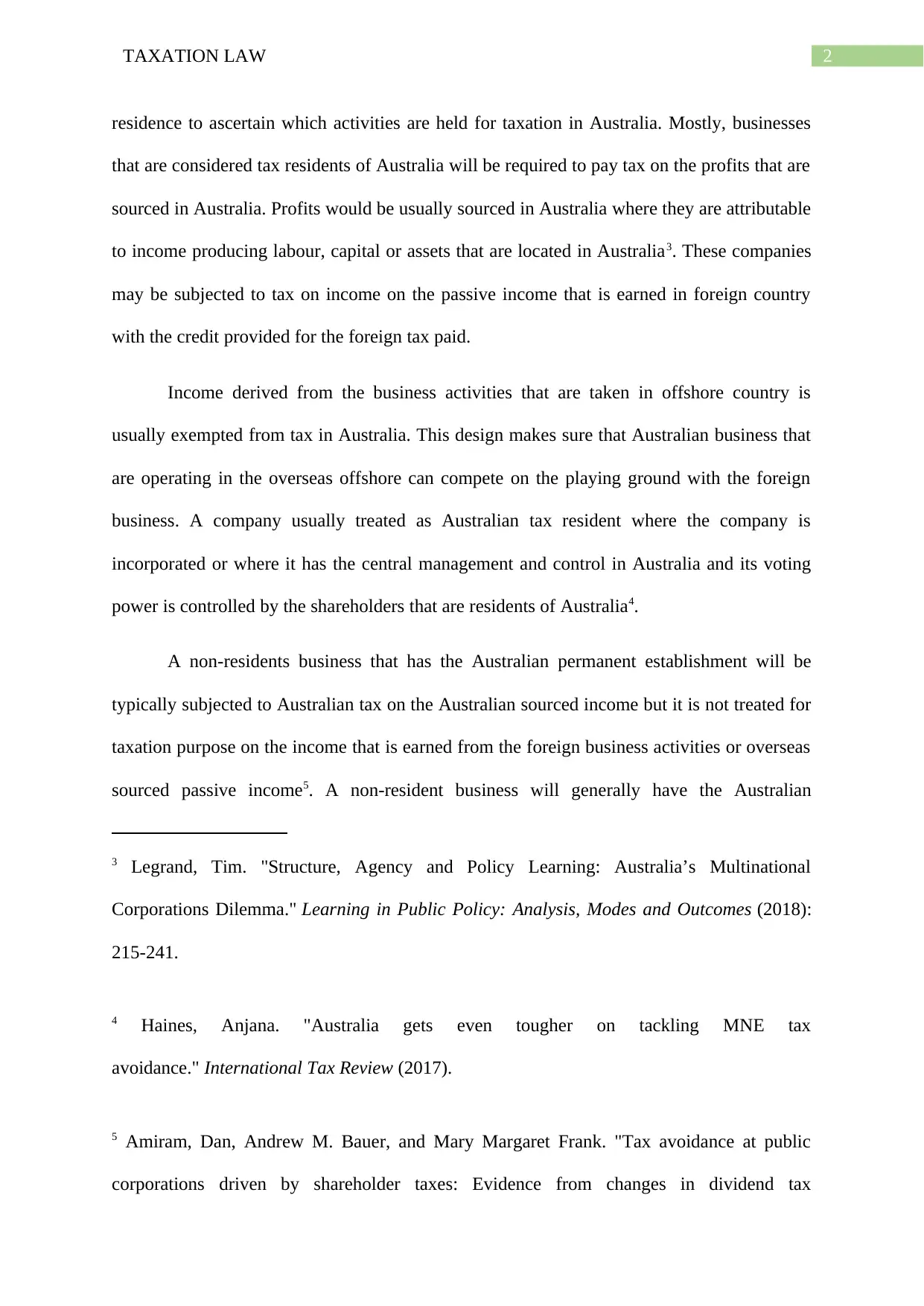
2TAXATION LAW
residence to ascertain which activities are held for taxation in Australia. Mostly, businesses
that are considered tax residents of Australia will be required to pay tax on the profits that are
sourced in Australia. Profits would be usually sourced in Australia where they are attributable
to income producing labour, capital or assets that are located in Australia3. These companies
may be subjected to tax on income on the passive income that is earned in foreign country
with the credit provided for the foreign tax paid.
Income derived from the business activities that are taken in offshore country is
usually exempted from tax in Australia. This design makes sure that Australian business that
are operating in the overseas offshore can compete on the playing ground with the foreign
business. A company usually treated as Australian tax resident where the company is
incorporated or where it has the central management and control in Australia and its voting
power is controlled by the shareholders that are residents of Australia4.
A non-residents business that has the Australian permanent establishment will be
typically subjected to Australian tax on the Australian sourced income but it is not treated for
taxation purpose on the income that is earned from the foreign business activities or overseas
sourced passive income5. A non-resident business will generally have the Australian
3 Legrand, Tim. "Structure, Agency and Policy Learning: Australia’s Multinational
Corporations Dilemma." Learning in Public Policy: Analysis, Modes and Outcomes (2018):
215-241.
4 Haines, Anjana. "Australia gets even tougher on tackling MNE tax
avoidance." International Tax Review (2017).
5 Amiram, Dan, Andrew M. Bauer, and Mary Margaret Frank. "Tax avoidance at public
corporations driven by shareholder taxes: Evidence from changes in dividend tax
residence to ascertain which activities are held for taxation in Australia. Mostly, businesses
that are considered tax residents of Australia will be required to pay tax on the profits that are
sourced in Australia. Profits would be usually sourced in Australia where they are attributable
to income producing labour, capital or assets that are located in Australia3. These companies
may be subjected to tax on income on the passive income that is earned in foreign country
with the credit provided for the foreign tax paid.
Income derived from the business activities that are taken in offshore country is
usually exempted from tax in Australia. This design makes sure that Australian business that
are operating in the overseas offshore can compete on the playing ground with the foreign
business. A company usually treated as Australian tax resident where the company is
incorporated or where it has the central management and control in Australia and its voting
power is controlled by the shareholders that are residents of Australia4.
A non-residents business that has the Australian permanent establishment will be
typically subjected to Australian tax on the Australian sourced income but it is not treated for
taxation purpose on the income that is earned from the foreign business activities or overseas
sourced passive income5. A non-resident business will generally have the Australian
3 Legrand, Tim. "Structure, Agency and Policy Learning: Australia’s Multinational
Corporations Dilemma." Learning in Public Policy: Analysis, Modes and Outcomes (2018):
215-241.
4 Haines, Anjana. "Australia gets even tougher on tackling MNE tax
avoidance." International Tax Review (2017).
5 Amiram, Dan, Andrew M. Bauer, and Mary Margaret Frank. "Tax avoidance at public
corporations driven by shareholder taxes: Evidence from changes in dividend tax
⊘ This is a preview!⊘
Do you want full access?
Subscribe today to unlock all pages.

Trusted by 1+ million students worldwide
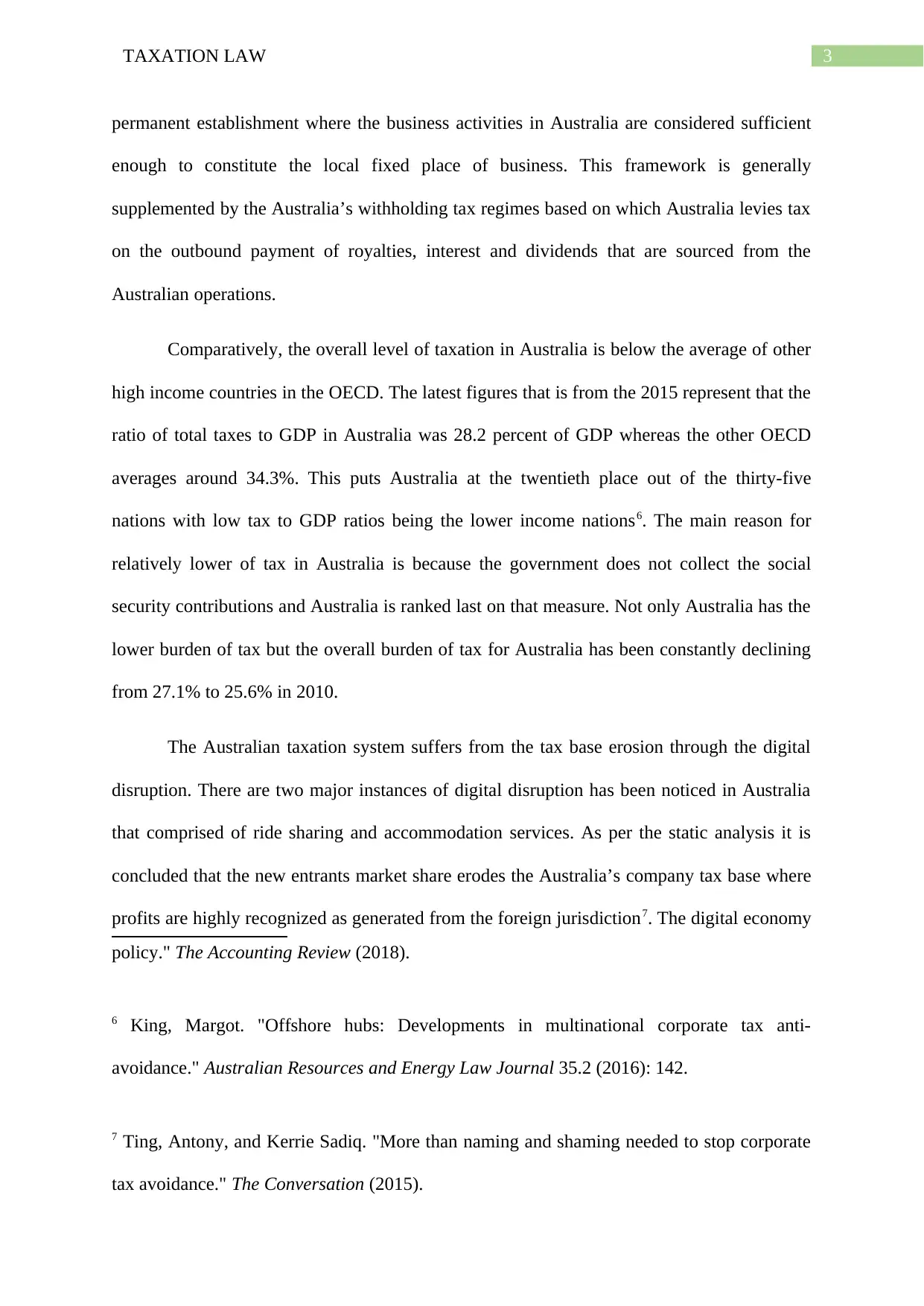
3TAXATION LAW
permanent establishment where the business activities in Australia are considered sufficient
enough to constitute the local fixed place of business. This framework is generally
supplemented by the Australia’s withholding tax regimes based on which Australia levies tax
on the outbound payment of royalties, interest and dividends that are sourced from the
Australian operations.
Comparatively, the overall level of taxation in Australia is below the average of other
high income countries in the OECD. The latest figures that is from the 2015 represent that the
ratio of total taxes to GDP in Australia was 28.2 percent of GDP whereas the other OECD
averages around 34.3%. This puts Australia at the twentieth place out of the thirty-five
nations with low tax to GDP ratios being the lower income nations6. The main reason for
relatively lower of tax in Australia is because the government does not collect the social
security contributions and Australia is ranked last on that measure. Not only Australia has the
lower burden of tax but the overall burden of tax for Australia has been constantly declining
from 27.1% to 25.6% in 2010.
The Australian taxation system suffers from the tax base erosion through the digital
disruption. There are two major instances of digital disruption has been noticed in Australia
that comprised of ride sharing and accommodation services. As per the static analysis it is
concluded that the new entrants market share erodes the Australia’s company tax base where
profits are highly recognized as generated from the foreign jurisdiction7. The digital economy
policy." The Accounting Review (2018).
6 King, Margot. "Offshore hubs: Developments in multinational corporate tax anti-
avoidance." Australian Resources and Energy Law Journal 35.2 (2016): 142.
7 Ting, Antony, and Kerrie Sadiq. "More than naming and shaming needed to stop corporate
tax avoidance." The Conversation (2015).
permanent establishment where the business activities in Australia are considered sufficient
enough to constitute the local fixed place of business. This framework is generally
supplemented by the Australia’s withholding tax regimes based on which Australia levies tax
on the outbound payment of royalties, interest and dividends that are sourced from the
Australian operations.
Comparatively, the overall level of taxation in Australia is below the average of other
high income countries in the OECD. The latest figures that is from the 2015 represent that the
ratio of total taxes to GDP in Australia was 28.2 percent of GDP whereas the other OECD
averages around 34.3%. This puts Australia at the twentieth place out of the thirty-five
nations with low tax to GDP ratios being the lower income nations6. The main reason for
relatively lower of tax in Australia is because the government does not collect the social
security contributions and Australia is ranked last on that measure. Not only Australia has the
lower burden of tax but the overall burden of tax for Australia has been constantly declining
from 27.1% to 25.6% in 2010.
The Australian taxation system suffers from the tax base erosion through the digital
disruption. There are two major instances of digital disruption has been noticed in Australia
that comprised of ride sharing and accommodation services. As per the static analysis it is
concluded that the new entrants market share erodes the Australia’s company tax base where
profits are highly recognized as generated from the foreign jurisdiction7. The digital economy
policy." The Accounting Review (2018).
6 King, Margot. "Offshore hubs: Developments in multinational corporate tax anti-
avoidance." Australian Resources and Energy Law Journal 35.2 (2016): 142.
7 Ting, Antony, and Kerrie Sadiq. "More than naming and shaming needed to stop corporate
tax avoidance." The Conversation (2015).
Paraphrase This Document
Need a fresh take? Get an instant paraphrase of this document with our AI Paraphraser
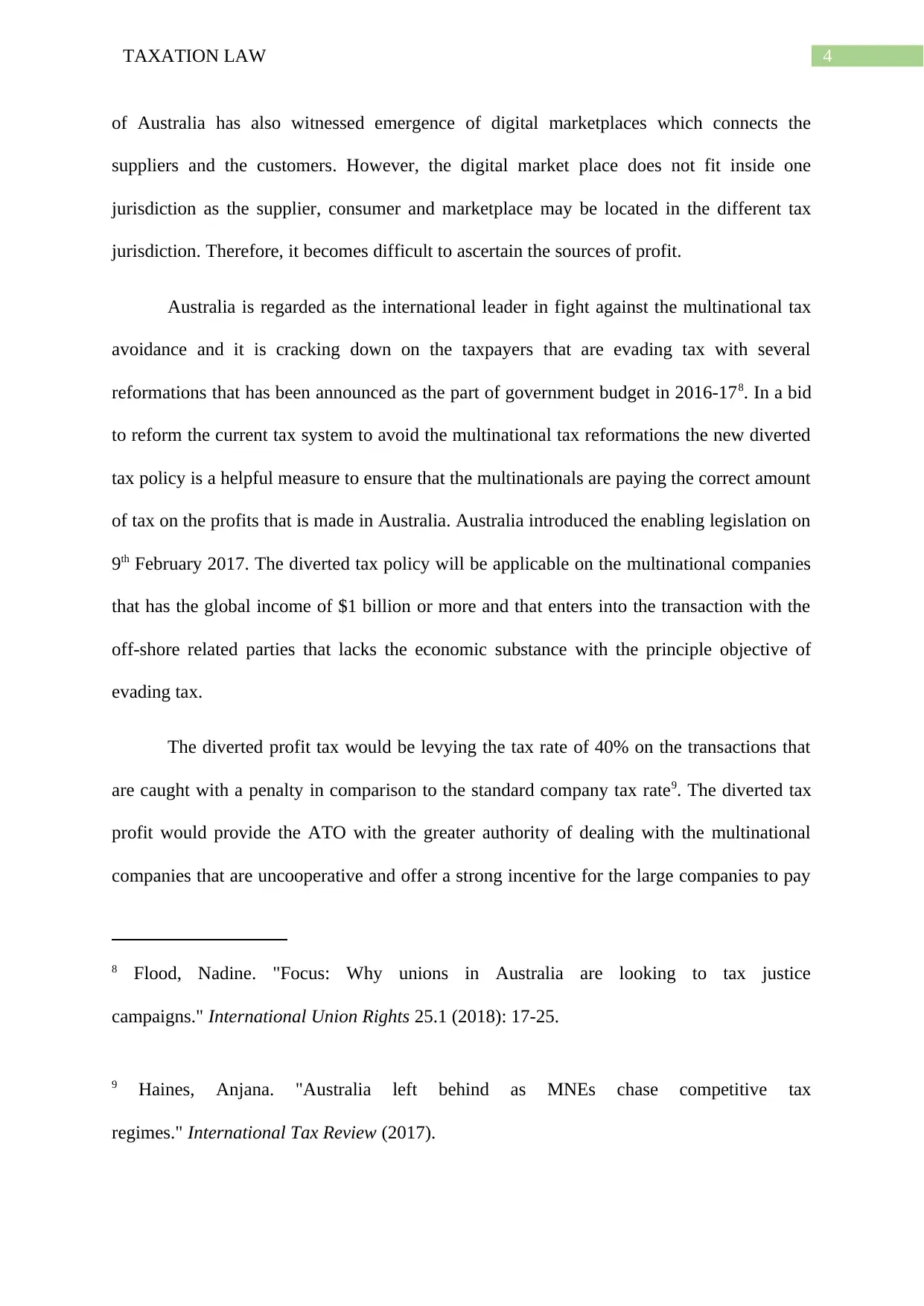
4TAXATION LAW
of Australia has also witnessed emergence of digital marketplaces which connects the
suppliers and the customers. However, the digital market place does not fit inside one
jurisdiction as the supplier, consumer and marketplace may be located in the different tax
jurisdiction. Therefore, it becomes difficult to ascertain the sources of profit.
Australia is regarded as the international leader in fight against the multinational tax
avoidance and it is cracking down on the taxpayers that are evading tax with several
reformations that has been announced as the part of government budget in 2016-178. In a bid
to reform the current tax system to avoid the multinational tax reformations the new diverted
tax policy is a helpful measure to ensure that the multinationals are paying the correct amount
of tax on the profits that is made in Australia. Australia introduced the enabling legislation on
9th February 2017. The diverted tax policy will be applicable on the multinational companies
that has the global income of $1 billion or more and that enters into the transaction with the
off-shore related parties that lacks the economic substance with the principle objective of
evading tax.
The diverted profit tax would be levying the tax rate of 40% on the transactions that
are caught with a penalty in comparison to the standard company tax rate9. The diverted tax
profit would provide the ATO with the greater authority of dealing with the multinational
companies that are uncooperative and offer a strong incentive for the large companies to pay
8 Flood, Nadine. "Focus: Why unions in Australia are looking to tax justice
campaigns." International Union Rights 25.1 (2018): 17-25.
9 Haines, Anjana. "Australia left behind as MNEs chase competitive tax
regimes." International Tax Review (2017).
of Australia has also witnessed emergence of digital marketplaces which connects the
suppliers and the customers. However, the digital market place does not fit inside one
jurisdiction as the supplier, consumer and marketplace may be located in the different tax
jurisdiction. Therefore, it becomes difficult to ascertain the sources of profit.
Australia is regarded as the international leader in fight against the multinational tax
avoidance and it is cracking down on the taxpayers that are evading tax with several
reformations that has been announced as the part of government budget in 2016-178. In a bid
to reform the current tax system to avoid the multinational tax reformations the new diverted
tax policy is a helpful measure to ensure that the multinationals are paying the correct amount
of tax on the profits that is made in Australia. Australia introduced the enabling legislation on
9th February 2017. The diverted tax policy will be applicable on the multinational companies
that has the global income of $1 billion or more and that enters into the transaction with the
off-shore related parties that lacks the economic substance with the principle objective of
evading tax.
The diverted profit tax would be levying the tax rate of 40% on the transactions that
are caught with a penalty in comparison to the standard company tax rate9. The diverted tax
profit would provide the ATO with the greater authority of dealing with the multinational
companies that are uncooperative and offer a strong incentive for the large companies to pay
8 Flood, Nadine. "Focus: Why unions in Australia are looking to tax justice
campaigns." International Union Rights 25.1 (2018): 17-25.
9 Haines, Anjana. "Australia left behind as MNEs chase competitive tax
regimes." International Tax Review (2017).
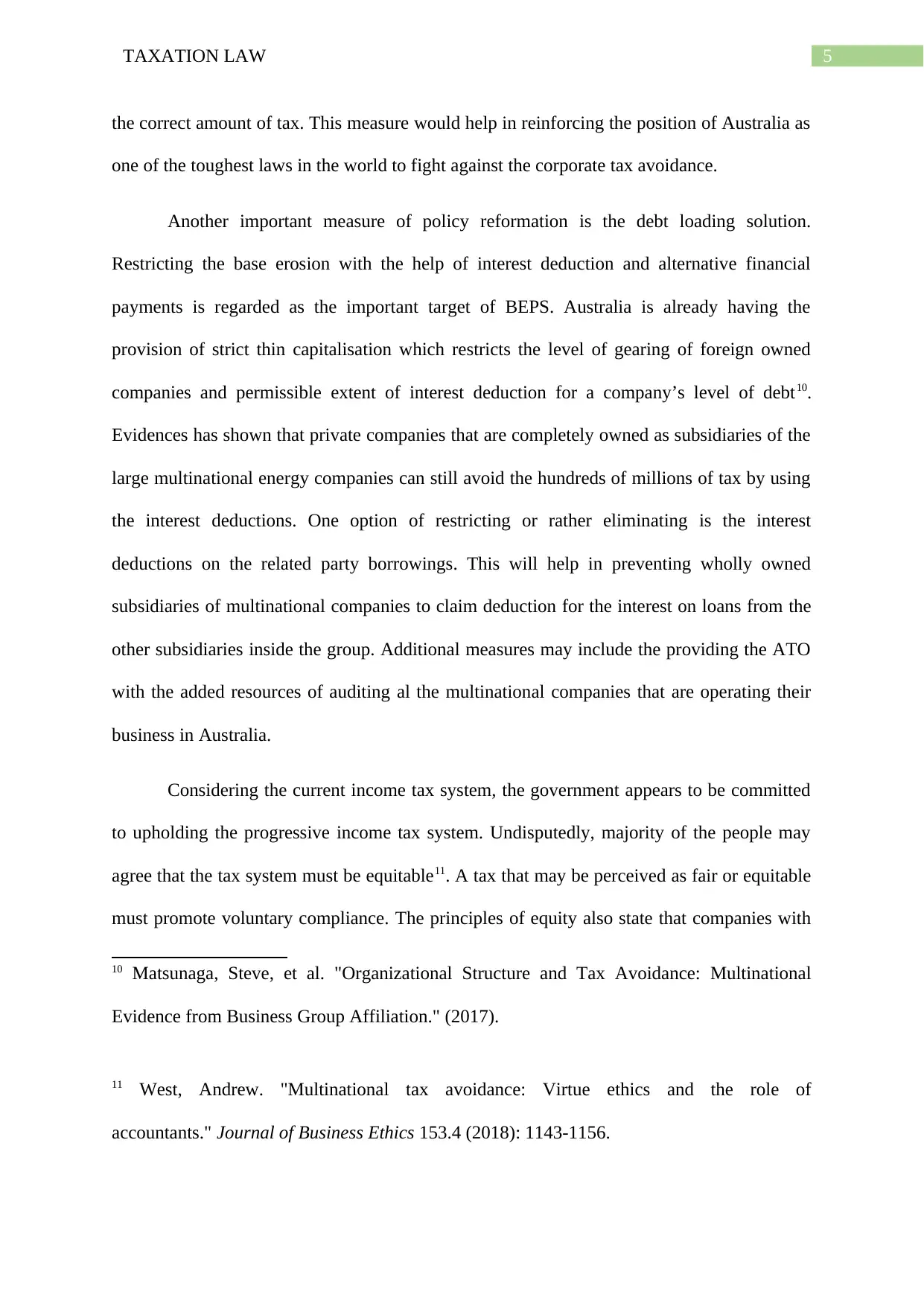
5TAXATION LAW
the correct amount of tax. This measure would help in reinforcing the position of Australia as
one of the toughest laws in the world to fight against the corporate tax avoidance.
Another important measure of policy reformation is the debt loading solution.
Restricting the base erosion with the help of interest deduction and alternative financial
payments is regarded as the important target of BEPS. Australia is already having the
provision of strict thin capitalisation which restricts the level of gearing of foreign owned
companies and permissible extent of interest deduction for a company’s level of debt10.
Evidences has shown that private companies that are completely owned as subsidiaries of the
large multinational energy companies can still avoid the hundreds of millions of tax by using
the interest deductions. One option of restricting or rather eliminating is the interest
deductions on the related party borrowings. This will help in preventing wholly owned
subsidiaries of multinational companies to claim deduction for the interest on loans from the
other subsidiaries inside the group. Additional measures may include the providing the ATO
with the added resources of auditing al the multinational companies that are operating their
business in Australia.
Considering the current income tax system, the government appears to be committed
to upholding the progressive income tax system. Undisputedly, majority of the people may
agree that the tax system must be equitable11. A tax that may be perceived as fair or equitable
must promote voluntary compliance. The principles of equity also state that companies with
10 Matsunaga, Steve, et al. "Organizational Structure and Tax Avoidance: Multinational
Evidence from Business Group Affiliation." (2017).
11 West, Andrew. "Multinational tax avoidance: Virtue ethics and the role of
accountants." Journal of Business Ethics 153.4 (2018): 1143-1156.
the correct amount of tax. This measure would help in reinforcing the position of Australia as
one of the toughest laws in the world to fight against the corporate tax avoidance.
Another important measure of policy reformation is the debt loading solution.
Restricting the base erosion with the help of interest deduction and alternative financial
payments is regarded as the important target of BEPS. Australia is already having the
provision of strict thin capitalisation which restricts the level of gearing of foreign owned
companies and permissible extent of interest deduction for a company’s level of debt10.
Evidences has shown that private companies that are completely owned as subsidiaries of the
large multinational energy companies can still avoid the hundreds of millions of tax by using
the interest deductions. One option of restricting or rather eliminating is the interest
deductions on the related party borrowings. This will help in preventing wholly owned
subsidiaries of multinational companies to claim deduction for the interest on loans from the
other subsidiaries inside the group. Additional measures may include the providing the ATO
with the added resources of auditing al the multinational companies that are operating their
business in Australia.
Considering the current income tax system, the government appears to be committed
to upholding the progressive income tax system. Undisputedly, majority of the people may
agree that the tax system must be equitable11. A tax that may be perceived as fair or equitable
must promote voluntary compliance. The principles of equity also state that companies with
10 Matsunaga, Steve, et al. "Organizational Structure and Tax Avoidance: Multinational
Evidence from Business Group Affiliation." (2017).
11 West, Andrew. "Multinational tax avoidance: Virtue ethics and the role of
accountants." Journal of Business Ethics 153.4 (2018): 1143-1156.
⊘ This is a preview!⊘
Do you want full access?
Subscribe today to unlock all pages.

Trusted by 1+ million students worldwide
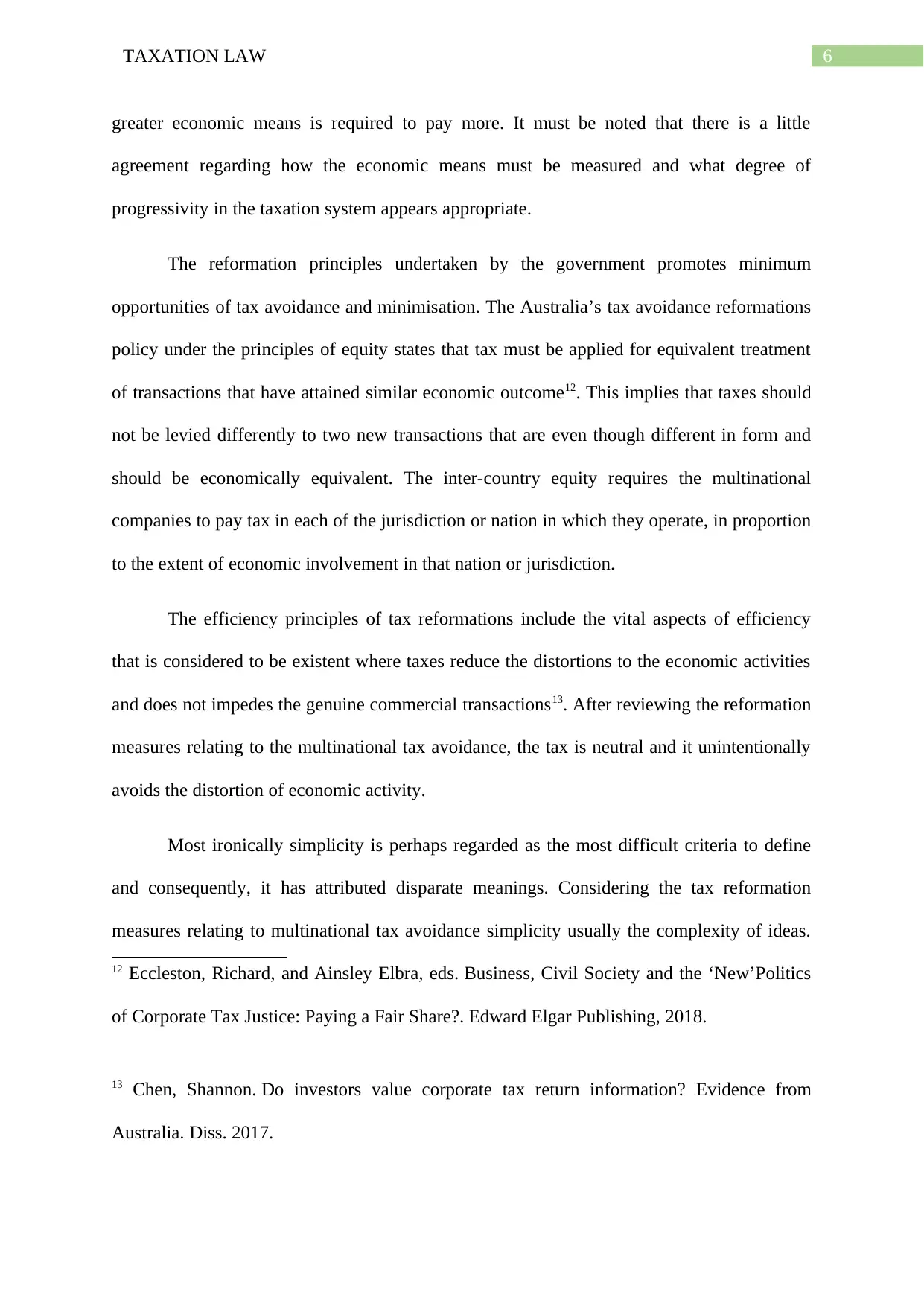
6TAXATION LAW
greater economic means is required to pay more. It must be noted that there is a little
agreement regarding how the economic means must be measured and what degree of
progressivity in the taxation system appears appropriate.
The reformation principles undertaken by the government promotes minimum
opportunities of tax avoidance and minimisation. The Australia’s tax avoidance reformations
policy under the principles of equity states that tax must be applied for equivalent treatment
of transactions that have attained similar economic outcome12. This implies that taxes should
not be levied differently to two new transactions that are even though different in form and
should be economically equivalent. The inter-country equity requires the multinational
companies to pay tax in each of the jurisdiction or nation in which they operate, in proportion
to the extent of economic involvement in that nation or jurisdiction.
The efficiency principles of tax reformations include the vital aspects of efficiency
that is considered to be existent where taxes reduce the distortions to the economic activities
and does not impedes the genuine commercial transactions13. After reviewing the reformation
measures relating to the multinational tax avoidance, the tax is neutral and it unintentionally
avoids the distortion of economic activity.
Most ironically simplicity is perhaps regarded as the most difficult criteria to define
and consequently, it has attributed disparate meanings. Considering the tax reformation
measures relating to multinational tax avoidance simplicity usually the complexity of ideas.
12 Eccleston, Richard, and Ainsley Elbra, eds. Business, Civil Society and the ‘New’Politics
of Corporate Tax Justice: Paying a Fair Share?. Edward Elgar Publishing, 2018.
13 Chen, Shannon. Do investors value corporate tax return information? Evidence from
Australia. Diss. 2017.
greater economic means is required to pay more. It must be noted that there is a little
agreement regarding how the economic means must be measured and what degree of
progressivity in the taxation system appears appropriate.
The reformation principles undertaken by the government promotes minimum
opportunities of tax avoidance and minimisation. The Australia’s tax avoidance reformations
policy under the principles of equity states that tax must be applied for equivalent treatment
of transactions that have attained similar economic outcome12. This implies that taxes should
not be levied differently to two new transactions that are even though different in form and
should be economically equivalent. The inter-country equity requires the multinational
companies to pay tax in each of the jurisdiction or nation in which they operate, in proportion
to the extent of economic involvement in that nation or jurisdiction.
The efficiency principles of tax reformations include the vital aspects of efficiency
that is considered to be existent where taxes reduce the distortions to the economic activities
and does not impedes the genuine commercial transactions13. After reviewing the reformation
measures relating to the multinational tax avoidance, the tax is neutral and it unintentionally
avoids the distortion of economic activity.
Most ironically simplicity is perhaps regarded as the most difficult criteria to define
and consequently, it has attributed disparate meanings. Considering the tax reformation
measures relating to multinational tax avoidance simplicity usually the complexity of ideas.
12 Eccleston, Richard, and Ainsley Elbra, eds. Business, Civil Society and the ‘New’Politics
of Corporate Tax Justice: Paying a Fair Share?. Edward Elgar Publishing, 2018.
13 Chen, Shannon. Do investors value corporate tax return information? Evidence from
Australia. Diss. 2017.
Paraphrase This Document
Need a fresh take? Get an instant paraphrase of this document with our AI Paraphraser
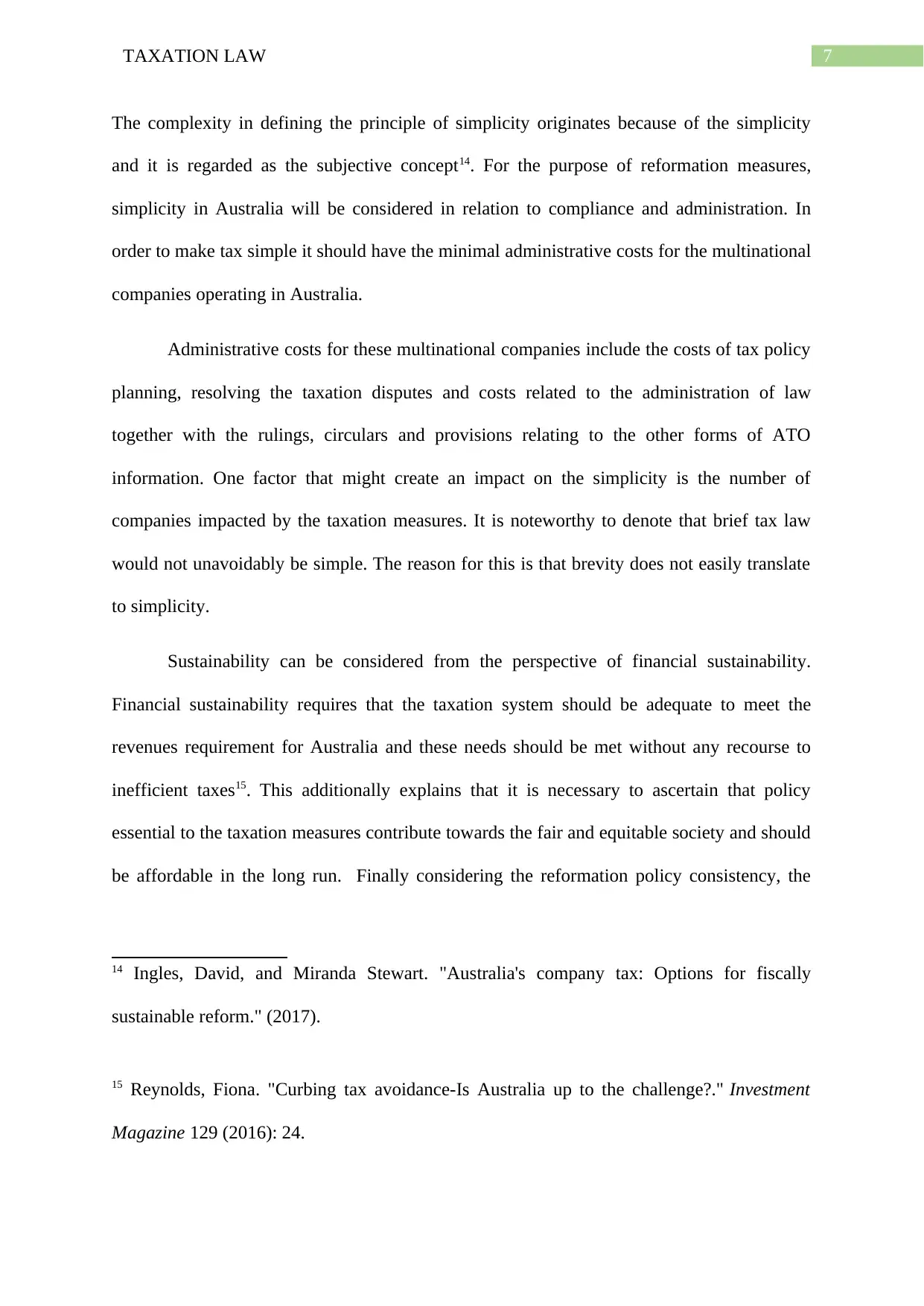
7TAXATION LAW
The complexity in defining the principle of simplicity originates because of the simplicity
and it is regarded as the subjective concept14. For the purpose of reformation measures,
simplicity in Australia will be considered in relation to compliance and administration. In
order to make tax simple it should have the minimal administrative costs for the multinational
companies operating in Australia.
Administrative costs for these multinational companies include the costs of tax policy
planning, resolving the taxation disputes and costs related to the administration of law
together with the rulings, circulars and provisions relating to the other forms of ATO
information. One factor that might create an impact on the simplicity is the number of
companies impacted by the taxation measures. It is noteworthy to denote that brief tax law
would not unavoidably be simple. The reason for this is that brevity does not easily translate
to simplicity.
Sustainability can be considered from the perspective of financial sustainability.
Financial sustainability requires that the taxation system should be adequate to meet the
revenues requirement for Australia and these needs should be met without any recourse to
inefficient taxes15. This additionally explains that it is necessary to ascertain that policy
essential to the taxation measures contribute towards the fair and equitable society and should
be affordable in the long run. Finally considering the reformation policy consistency, the
14 Ingles, David, and Miranda Stewart. "Australia's company tax: Options for fiscally
sustainable reform." (2017).
15 Reynolds, Fiona. "Curbing tax avoidance-Is Australia up to the challenge?." Investment
Magazine 129 (2016): 24.
The complexity in defining the principle of simplicity originates because of the simplicity
and it is regarded as the subjective concept14. For the purpose of reformation measures,
simplicity in Australia will be considered in relation to compliance and administration. In
order to make tax simple it should have the minimal administrative costs for the multinational
companies operating in Australia.
Administrative costs for these multinational companies include the costs of tax policy
planning, resolving the taxation disputes and costs related to the administration of law
together with the rulings, circulars and provisions relating to the other forms of ATO
information. One factor that might create an impact on the simplicity is the number of
companies impacted by the taxation measures. It is noteworthy to denote that brief tax law
would not unavoidably be simple. The reason for this is that brevity does not easily translate
to simplicity.
Sustainability can be considered from the perspective of financial sustainability.
Financial sustainability requires that the taxation system should be adequate to meet the
revenues requirement for Australia and these needs should be met without any recourse to
inefficient taxes15. This additionally explains that it is necessary to ascertain that policy
essential to the taxation measures contribute towards the fair and equitable society and should
be affordable in the long run. Finally considering the reformation policy consistency, the
14 Ingles, David, and Miranda Stewart. "Australia's company tax: Options for fiscally
sustainable reform." (2017).
15 Reynolds, Fiona. "Curbing tax avoidance-Is Australia up to the challenge?." Investment
Magazine 129 (2016): 24.
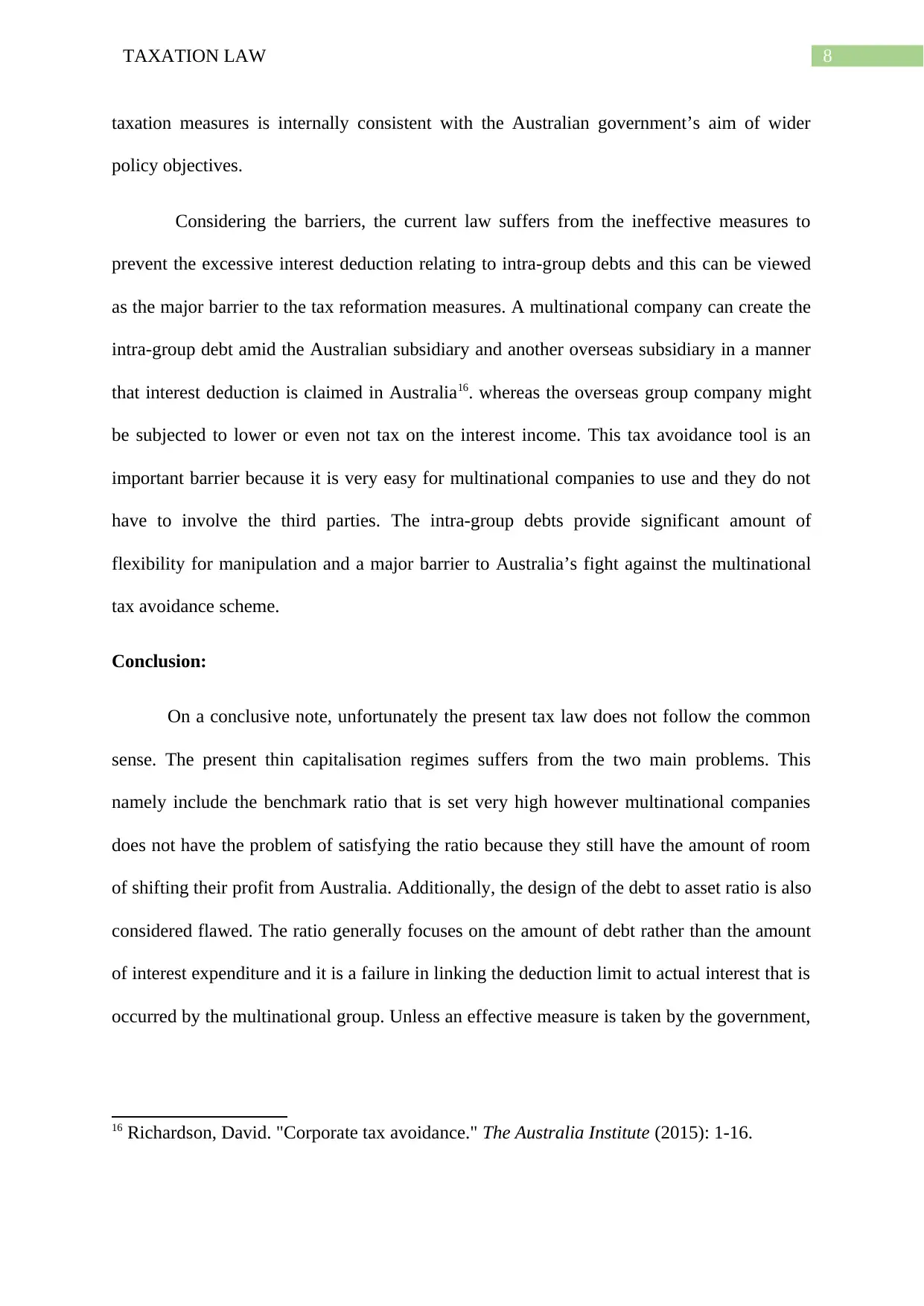
8TAXATION LAW
taxation measures is internally consistent with the Australian government’s aim of wider
policy objectives.
Considering the barriers, the current law suffers from the ineffective measures to
prevent the excessive interest deduction relating to intra-group debts and this can be viewed
as the major barrier to the tax reformation measures. A multinational company can create the
intra-group debt amid the Australian subsidiary and another overseas subsidiary in a manner
that interest deduction is claimed in Australia16. whereas the overseas group company might
be subjected to lower or even not tax on the interest income. This tax avoidance tool is an
important barrier because it is very easy for multinational companies to use and they do not
have to involve the third parties. The intra-group debts provide significant amount of
flexibility for manipulation and a major barrier to Australia’s fight against the multinational
tax avoidance scheme.
Conclusion:
On a conclusive note, unfortunately the present tax law does not follow the common
sense. The present thin capitalisation regimes suffers from the two main problems. This
namely include the benchmark ratio that is set very high however multinational companies
does not have the problem of satisfying the ratio because they still have the amount of room
of shifting their profit from Australia. Additionally, the design of the debt to asset ratio is also
considered flawed. The ratio generally focuses on the amount of debt rather than the amount
of interest expenditure and it is a failure in linking the deduction limit to actual interest that is
occurred by the multinational group. Unless an effective measure is taken by the government,
16 Richardson, David. "Corporate tax avoidance." The Australia Institute (2015): 1-16.
taxation measures is internally consistent with the Australian government’s aim of wider
policy objectives.
Considering the barriers, the current law suffers from the ineffective measures to
prevent the excessive interest deduction relating to intra-group debts and this can be viewed
as the major barrier to the tax reformation measures. A multinational company can create the
intra-group debt amid the Australian subsidiary and another overseas subsidiary in a manner
that interest deduction is claimed in Australia16. whereas the overseas group company might
be subjected to lower or even not tax on the interest income. This tax avoidance tool is an
important barrier because it is very easy for multinational companies to use and they do not
have to involve the third parties. The intra-group debts provide significant amount of
flexibility for manipulation and a major barrier to Australia’s fight against the multinational
tax avoidance scheme.
Conclusion:
On a conclusive note, unfortunately the present tax law does not follow the common
sense. The present thin capitalisation regimes suffers from the two main problems. This
namely include the benchmark ratio that is set very high however multinational companies
does not have the problem of satisfying the ratio because they still have the amount of room
of shifting their profit from Australia. Additionally, the design of the debt to asset ratio is also
considered flawed. The ratio generally focuses on the amount of debt rather than the amount
of interest expenditure and it is a failure in linking the deduction limit to actual interest that is
occurred by the multinational group. Unless an effective measure is taken by the government,
16 Richardson, David. "Corporate tax avoidance." The Australia Institute (2015): 1-16.
⊘ This is a preview!⊘
Do you want full access?
Subscribe today to unlock all pages.

Trusted by 1+ million students worldwide

9TAXATION LAW
multinational companies would most likely continue to shift their profit from Australia by
using intra-group debts.
multinational companies would most likely continue to shift their profit from Australia by
using intra-group debts.
Paraphrase This Document
Need a fresh take? Get an instant paraphrase of this document with our AI Paraphraser
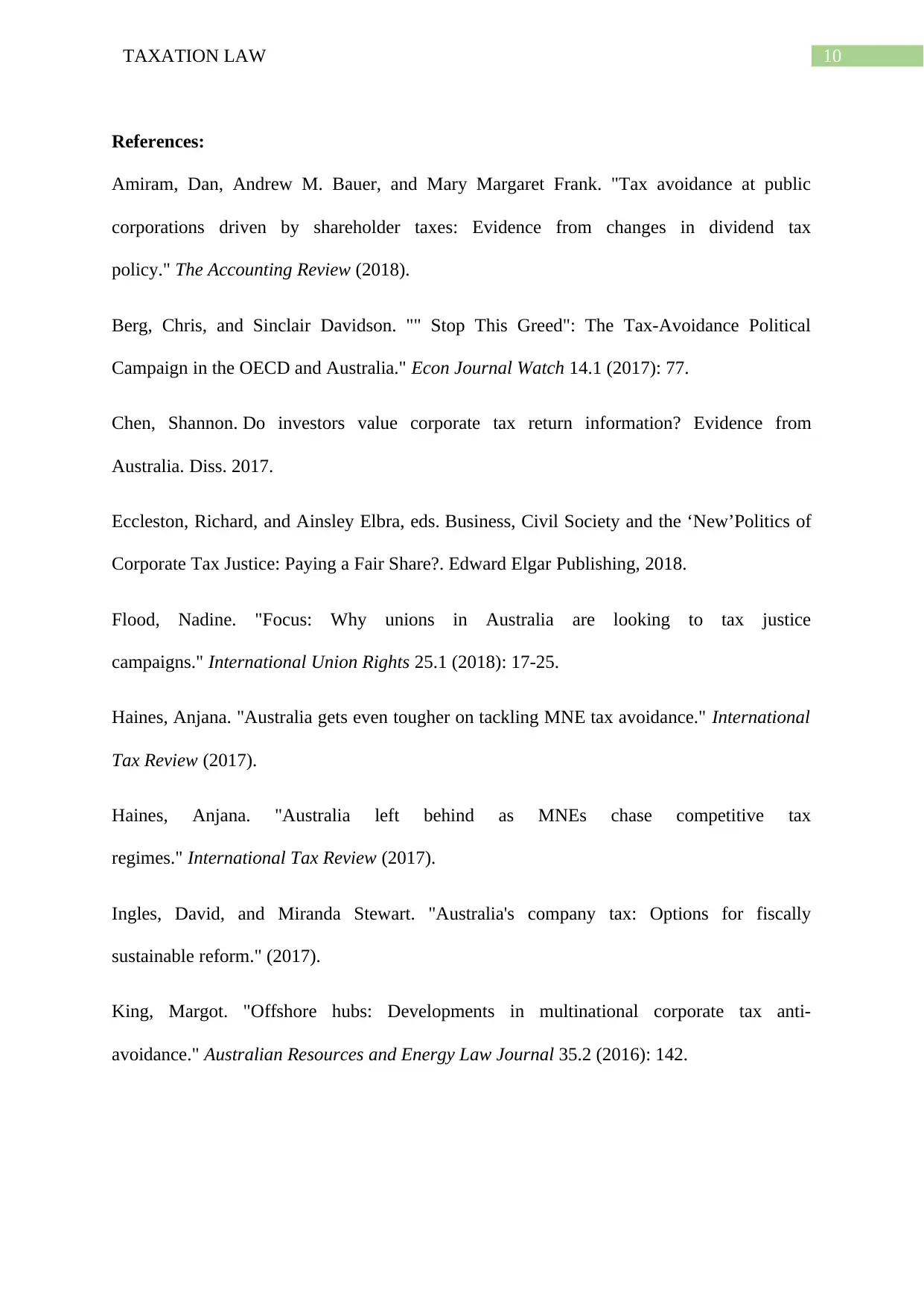
10TAXATION LAW
References:
Amiram, Dan, Andrew M. Bauer, and Mary Margaret Frank. "Tax avoidance at public
corporations driven by shareholder taxes: Evidence from changes in dividend tax
policy." The Accounting Review (2018).
Berg, Chris, and Sinclair Davidson. "" Stop This Greed": The Tax-Avoidance Political
Campaign in the OECD and Australia." Econ Journal Watch 14.1 (2017): 77.
Chen, Shannon. Do investors value corporate tax return information? Evidence from
Australia. Diss. 2017.
Eccleston, Richard, and Ainsley Elbra, eds. Business, Civil Society and the ‘New’Politics of
Corporate Tax Justice: Paying a Fair Share?. Edward Elgar Publishing, 2018.
Flood, Nadine. "Focus: Why unions in Australia are looking to tax justice
campaigns." International Union Rights 25.1 (2018): 17-25.
Haines, Anjana. "Australia gets even tougher on tackling MNE tax avoidance." International
Tax Review (2017).
Haines, Anjana. "Australia left behind as MNEs chase competitive tax
regimes." International Tax Review (2017).
Ingles, David, and Miranda Stewart. "Australia's company tax: Options for fiscally
sustainable reform." (2017).
King, Margot. "Offshore hubs: Developments in multinational corporate tax anti-
avoidance." Australian Resources and Energy Law Journal 35.2 (2016): 142.
References:
Amiram, Dan, Andrew M. Bauer, and Mary Margaret Frank. "Tax avoidance at public
corporations driven by shareholder taxes: Evidence from changes in dividend tax
policy." The Accounting Review (2018).
Berg, Chris, and Sinclair Davidson. "" Stop This Greed": The Tax-Avoidance Political
Campaign in the OECD and Australia." Econ Journal Watch 14.1 (2017): 77.
Chen, Shannon. Do investors value corporate tax return information? Evidence from
Australia. Diss. 2017.
Eccleston, Richard, and Ainsley Elbra, eds. Business, Civil Society and the ‘New’Politics of
Corporate Tax Justice: Paying a Fair Share?. Edward Elgar Publishing, 2018.
Flood, Nadine. "Focus: Why unions in Australia are looking to tax justice
campaigns." International Union Rights 25.1 (2018): 17-25.
Haines, Anjana. "Australia gets even tougher on tackling MNE tax avoidance." International
Tax Review (2017).
Haines, Anjana. "Australia left behind as MNEs chase competitive tax
regimes." International Tax Review (2017).
Ingles, David, and Miranda Stewart. "Australia's company tax: Options for fiscally
sustainable reform." (2017).
King, Margot. "Offshore hubs: Developments in multinational corporate tax anti-
avoidance." Australian Resources and Energy Law Journal 35.2 (2016): 142.
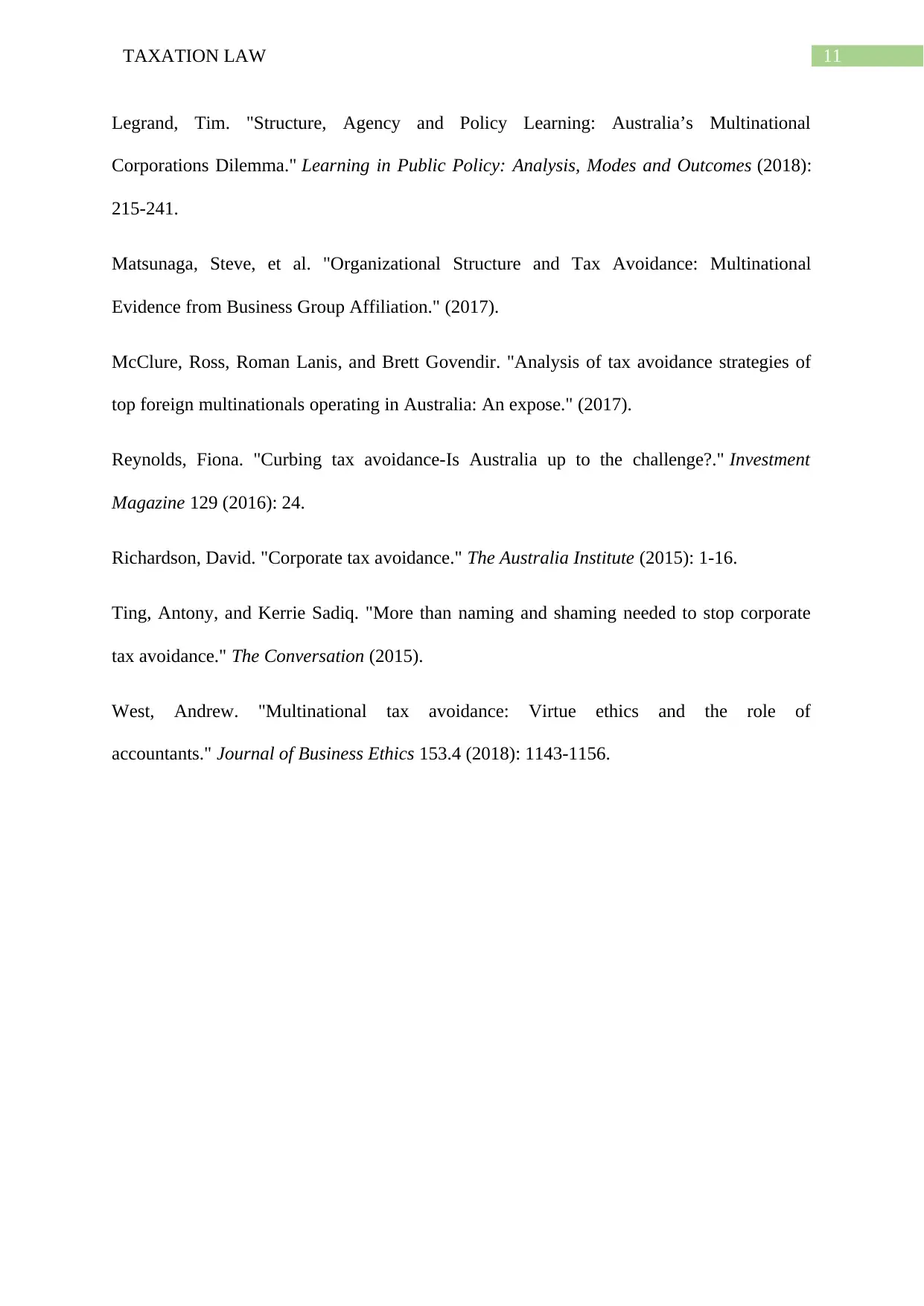
11TAXATION LAW
Legrand, Tim. "Structure, Agency and Policy Learning: Australia’s Multinational
Corporations Dilemma." Learning in Public Policy: Analysis, Modes and Outcomes (2018):
215-241.
Matsunaga, Steve, et al. "Organizational Structure and Tax Avoidance: Multinational
Evidence from Business Group Affiliation." (2017).
McClure, Ross, Roman Lanis, and Brett Govendir. "Analysis of tax avoidance strategies of
top foreign multinationals operating in Australia: An expose." (2017).
Reynolds, Fiona. "Curbing tax avoidance-Is Australia up to the challenge?." Investment
Magazine 129 (2016): 24.
Richardson, David. "Corporate tax avoidance." The Australia Institute (2015): 1-16.
Ting, Antony, and Kerrie Sadiq. "More than naming and shaming needed to stop corporate
tax avoidance." The Conversation (2015).
West, Andrew. "Multinational tax avoidance: Virtue ethics and the role of
accountants." Journal of Business Ethics 153.4 (2018): 1143-1156.
Legrand, Tim. "Structure, Agency and Policy Learning: Australia’s Multinational
Corporations Dilemma." Learning in Public Policy: Analysis, Modes and Outcomes (2018):
215-241.
Matsunaga, Steve, et al. "Organizational Structure and Tax Avoidance: Multinational
Evidence from Business Group Affiliation." (2017).
McClure, Ross, Roman Lanis, and Brett Govendir. "Analysis of tax avoidance strategies of
top foreign multinationals operating in Australia: An expose." (2017).
Reynolds, Fiona. "Curbing tax avoidance-Is Australia up to the challenge?." Investment
Magazine 129 (2016): 24.
Richardson, David. "Corporate tax avoidance." The Australia Institute (2015): 1-16.
Ting, Antony, and Kerrie Sadiq. "More than naming and shaming needed to stop corporate
tax avoidance." The Conversation (2015).
West, Andrew. "Multinational tax avoidance: Virtue ethics and the role of
accountants." Journal of Business Ethics 153.4 (2018): 1143-1156.
⊘ This is a preview!⊘
Do you want full access?
Subscribe today to unlock all pages.

Trusted by 1+ million students worldwide
1 out of 12
Related Documents
Your All-in-One AI-Powered Toolkit for Academic Success.
+13062052269
info@desklib.com
Available 24*7 on WhatsApp / Email
![[object Object]](/_next/static/media/star-bottom.7253800d.svg)
Unlock your academic potential
Copyright © 2020–2026 A2Z Services. All Rights Reserved. Developed and managed by ZUCOL.




